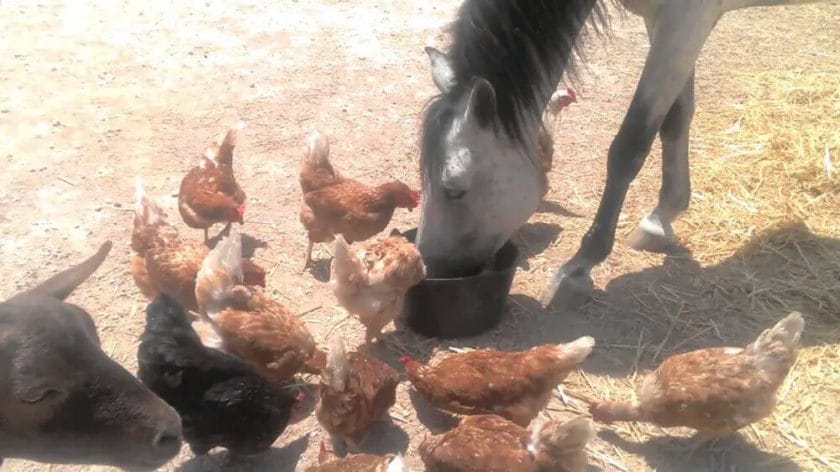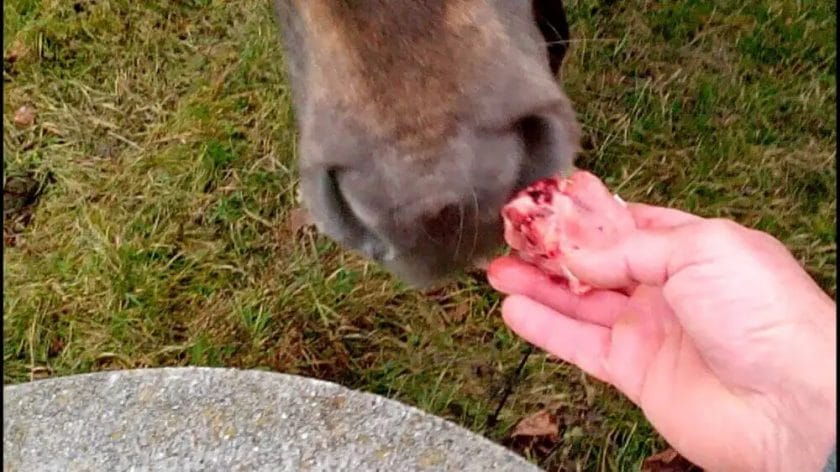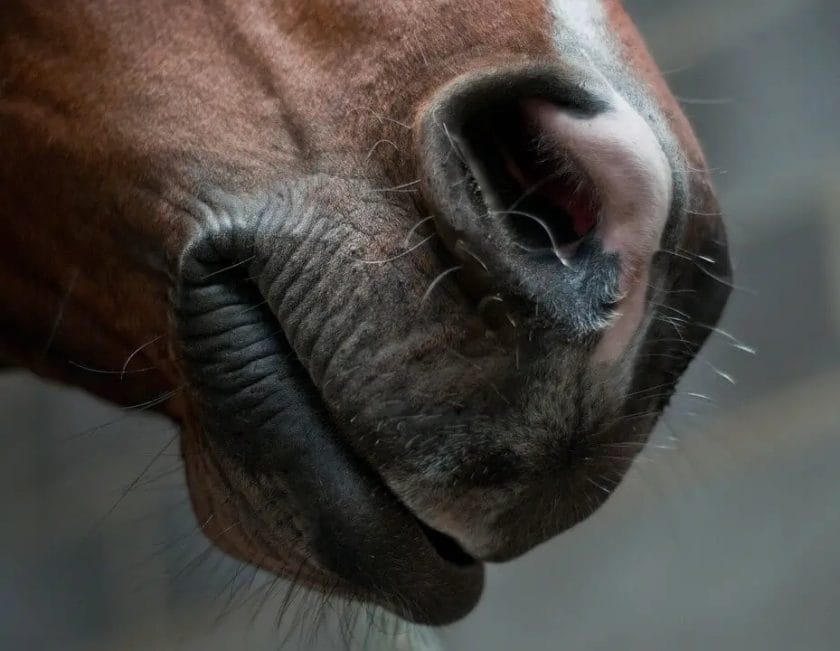Horses do not typically eat chickens as part of their natural diet. Horses are herbivores and primarily consume grasses, hay, and grains. While horses may show curiosity towards small animals such as chickens, it is important to ensure that horses are not exposed to potential harm or stress caused by interactions with other animals. Proper nutrition and feeding practices are essential for maintaining a horse’s health and well-being.

Understanding the Feeding Habits of Horses: Can They Consume Chickens?
Feeding horses is an important aspect of their care and well-being. It is crucial to provide them with a balanced diet that meets their nutritional needs. While horses are herbivores and primarily consume plant-based foods, there may be instances where they come across other animals, such as chickens. In this section, we will explore the feeding habits of horses and whether or not they can consume chickens.
1. What Do Horses Eat?
Horses are grazing animals and have a natural inclination towards consuming grass and other forms of vegetation. Their digestive system is designed to process fibrous material efficiently. In the wild, horses spend a significant amount of their time grazing, consuming a variety of grasses, herbs, and leaves. This high-fiber diet ensures the proper functioning of their digestive system.
In addition to grazing, horses may also consume hay, which is dried grass or legume plants. Hay is commonly fed to domesticated horses when fresh pasture is not available or during winter months when grass growth is limited. It provides them with the necessary fiber, vitamins, and minerals.
Furthermore, horses can also benefit from additional feed such as grains, concentrates, and supplements. These feeds are formulated to provide horses with specific nutrients, particularly when their dietary requirements are not sufficiently met by grazing or hay alone.
2. Can Horses Consume Chickens?
Horses are herbivores and have a digestive system adapted for processing plant-based foods. While they may occasionally come into contact with small animals or insects while grazing, their natural feeding habits do not include consuming meat. Therefore, it is highly unlikely that horses would willingly consume chickens or any other animals for that matter.
Horses have a limited ability to digest and absorb nutrients from animal protein. Their digestive system is specialized for breaking down plant cellulose and extracting nutrients from plant matter. Consuming meat or animal products can be challenging for them to digest and may cause digestive disturbances.
It is worth noting that horses are known to have individual preferences and may exhibit curious behavior towards small animals. However, this behavior is typically out of curiosity rather than a desire to consume them as a food source.
3. Safety Precautions
Although horses do not typically consume chickens or other animals, it is still important to take precautions to ensure the safety of both the horses and the other animals. Chickens and horses should be kept in separate enclosures to prevent any potential harm or stress to either species.
Additionally, it is important to provide horses with a well-balanced diet that meets their nutritional needs. Consult with a veterinarian or equine nutritionist to develop an appropriate feeding plan for your horse based on their individual requirements.
Summary
Horses are herbivores with a natural inclination towards consuming plant-based foods. Their feeding habits primarily revolve around grazing on grass and other vegetation. While horses may occasionally come into contact with small animals while grazing, it is unlikely that they would consume them willingly.
Providing horses with a balanced diet that meets their nutritional needs is essential for their overall health and well-being. It is important to remember that each horse is an individual with unique dietary requirements, and consulting with a professional is recommended to ensure proper feeding practices.

Factors to Consider: Feeding Chickens to Horses
Feeding chickens to horses is a practice that has gained popularity among some horse owners. While horses are primarily herbivores and have a diet that consists mainly of grass and hay, there are certain factors that need to be considered before introducing chickens into their diet. In this section, we will explore these factors in detail.
Digestive System Differences
One of the main factors to consider when feeding chickens to horses is the difference in their digestive systems. Horses have a hindgut fermentation system, meaning that the majority of digestion takes place in the large intestine. On the other hand, chickens have a monogastric digestive system, similar to humans, where digestion occurs in the stomach and small intestine.
Due to these differences, horses are not able to efficiently digest and absorb the nutrients from chickens. The high protein content found in chickens can be difficult for horses to break down and utilize effectively. This can lead to digestive issues such as colic and laminitis if chickens are fed in excessive amounts.
Nutritional Balance
Another important factor to consider is the nutritional balance of the horse’s diet. Horses require a specific balance of protein, carbohydrates, fats, vitamins, and minerals to maintain optimal health. While chickens are a good source of protein, they may not provide the necessary balance of other essential nutrients that horses need.
Feeding chickens as a sole source of protein can result in an imbalance in the horse’s diet, leading to deficiencies or excesses in certain nutrients. It is essential to consult with a veterinarian or equine nutritionist to ensure that the horse’s diet is properly balanced and meets their specific nutritional requirements.
Health Risks
Feeding chickens to horses also poses certain health risks. Chickens can carry diseases such as avian influenza and salmonella, which can be transmitted to horses. These diseases can cause various health issues in horses, including respiratory problems, gastrointestinal disturbances, and even death.
Additionally, if the chickens are not properly prepared or cooked before being fed to horses, there is a risk of bacterial contamination. This can lead to digestive upsets and infections in horses. It is crucial to handle and prepare chickens safely to minimize the risk of bacterial contamination.
Alternative Protein Sources
Considering the potential drawbacks of feeding chickens to horses, it is recommended to explore alternative protein sources that are more suitable for horses. There are various commercial equine feed options available that are specifically formulated to meet the nutritional needs of horses.
These feeds often contain a balanced combination of protein, carbohydrates, fats, vitamins, and minerals to ensure optimal health and performance. Additionally, alternative protein sources such as soybean meal or alfalfa can be added to the horse’s diet to meet their protein requirements without the associated risks.
Summary
Feeding chickens to horses is a practice that requires careful consideration. The digestive system differences, nutritional balance, health risks, and availability of alternative protein sources should all be taken into account before incorporating chickens into a horse’s diet. It is crucial to prioritize the overall health and well-being of the horse and consult with a veterinarian or equine nutritionist for personalized dietary recommendations.

Potential Benefits and Risks of Feeding Chickens to Horses
Feeding chickens to horses is a practice that has gained popularity among some horse owners, but it is important to understand both the potential benefits and risks associated with this feeding strategy. In this section, we will explore the advantages and disadvantages of incorporating chickens into a horse’s diet.
Potential Benefits
1. Protein Source: Chickens are a rich source of protein, and including them in a horse’s diet can provide an additional protein source. Protein is essential for muscle development, tissue repair, and overall growth in horses. By introducing chickens, horse owners can supplement the protein levels in their horse’s diet.
2. Omega-3 Fatty Acids: Chickens that are fed a diet high in Omega-3 fatty acids can contribute to increasing the levels of these beneficial fatty acids in the horse’s diet as well. Omega-3 fatty acids have several health benefits for horses, such as improving joint health, promoting a healthy coat, and supporting immune function.
3. Natural Prey Instinct: Horses have a natural prey instinct, and incorporating chickens into their diet can help simulate their natural feeding behaviors. This can provide mental stimulation and enrichment to horses, as they engage in hunting and foraging activities.
Potential Risks
1. Salmonella Contamination: Chickens are known carriers of Salmonella, a type of bacteria that can cause food poisoning in horses. If chickens are not properly handled and prepared before feeding, there is a risk of transmitting Salmonella to horses. It is crucial to ensure proper hygiene and food safety practices when introducing chickens to a horse’s diet.
2. Allergic Reactions: Horses can develop allergic reactions to certain proteins present in chickens. These allergies can manifest as skin irritations, respiratory issues, or gastrointestinal disturbances. Careful monitoring and observation of the horse’s reaction to chicken-based feeds is essential to identify and manage any allergies or sensitivities.
3. Imbalanced Diet: While chickens can provide additional protein, they may not offer a complete and balanced diet for horses. Horses require a specific balance of nutrients, including vitamins, minerals, and fiber. Over-reliance on chickens as a primary protein source may lead to nutritional deficiencies or imbalances if other essential nutrients are not adequately provided.
In summary, incorporating chickens into a horse’s diet can have potential benefits such as providing an additional protein source, increasing the levels of Omega-3 fatty acids, and stimulating natural prey instincts. However, it is crucial to be aware of the risks associated with feeding chickens to horses, including Salmonella contamination, allergic reactions, and the potential for an imbalanced diet. Consultation with a veterinarian is recommended before making any significant dietary changes to ensure the horse’s health and well-being.
Alternative Protein Sources for Horses: Exploring Chicken as an Option
Protein is an essential nutrient for horses as it aids in muscle development, tissue repair, and overall growth. Traditionally, horses have been fed diets consisting primarily of hay, grains, and forage. However, with advancements in equine nutrition, owners and trainers are now exploring alternative protein sources to supplement their horse’s diet.
One such alternative protein source that has gained significant attention is chicken. While chicken is commonly associated with human diets, it has been found to be a viable option for horses as well. In this section, we will delve into the benefits and considerations of using chicken as a protein source for horses.
Benefits of Chicken as a Protein Source
1. High-quality Protein: Chicken is known for its high-quality protein content, containing all essential amino acids required by horses for optimal health and performance. The amino acids present in chicken protein are easily digestible and readily absorbed by the horse’s digestive system.
2. Balanced Amino Acid Profile: The amino acid profile of chicken protein closely matches the requirements of horses, making it an excellent source of balanced nutrition. This ensures that horses receive the required amino acids in the right proportions for their body’s needs.
3. Reduced Allergenicity: Chicken is a hypoallergenic protein source, making it suitable for horses with food sensitivities or allergies. Some horses may develop allergies or sensitivities to other protein sources like soy or fish, making chicken a safe alternative.
4. Palatability: Horses generally find chicken to be highly palatable, which can be beneficial for picky eaters or horses that are transitioning to a new diet. The enticing taste of chicken can encourage horses to consume their feed more readily, ensuring they receive the necessary protein intake.
Considerations when Using Chicken as a Protein Source for Horses
1. Preparation and Cooking: Chicken should be thoroughly cooked and prepared before feeding it to horses. This ensures that any potential bacteria or contaminants are eliminated, reducing the risk of digestive issues or infections in horses. It is advisable to consult with a veterinarian or equine nutritionist to determine the appropriate method of preparation.
2. Quantity and Balance: While chicken can be a valuable protein source for horses, it should not replace their primary source of nutrition. It is essential to maintain a balanced diet that includes a variety of protein sources, including forages and grains. The quantity of chicken fed should be carefully monitored to prevent overconsumption or imbalances in the overall diet.
3. Individual Horse Considerations: Each horse is unique and may have varying dietary requirements. Factors such as age, weight, activity level, and health conditions should be taken into account when incorporating chicken into their diet. Consulting with an equine nutritionist will help determine the appropriate quantity and frequency of chicken protein supplementation.
In summary, chicken can be a beneficial alternative protein source for horses. Its high-quality protein content, balanced amino acid profile, reduced allergenicity, and palatability make it a promising choice. However, proper preparation, quantity monitoring, and individual horse considerations are essential for safely incorporating chicken into a horse’s diet. By working closely with a veterinarian or equine nutritionist, horse owners and trainers can explore the potential benefits of using chicken as a protein source for their equine companions.
FAQs
Can horses eat chickens?
No, horses do not eat chickens. Horses are herbivores and primarily eat grass, hay, and grains. Their digestive systems are not designed to consume meat or poultry.
What do horses eat?
Horses mainly eat grass, hay, and grains. They require a high-fiber diet to maintain good digestive health. Additionally, they need access to clean water and should not be fed toxic plants or excessive amounts of sugary treats.
Can horses eat fruits and vegetables?
Yes, horses can eat certain fruits and vegetables in moderation. Examples include apples, carrots, and bananas. However, it’s important to introduce new foods gradually and avoid feeding them anything that could be harmful or toxic.
Conclusion
In conclusion, horses do not typically eat chickens. Horses are herbivores and their natural diet consists mainly of grasses, hay, and grains. They are not biologically equipped to digest meat, including chickens. However, it is important to ensure proper feeding and management to prevent any accidental ingestion of harmful substances or objects. Horses should be provided with a balanced diet that meets their nutritional needs and maintained in a safe and secure environment to avoid any potential incidents. By understanding and meeting the dietary requirements of horses, owners can ensure the health and well-being of their beloved equine companions.
